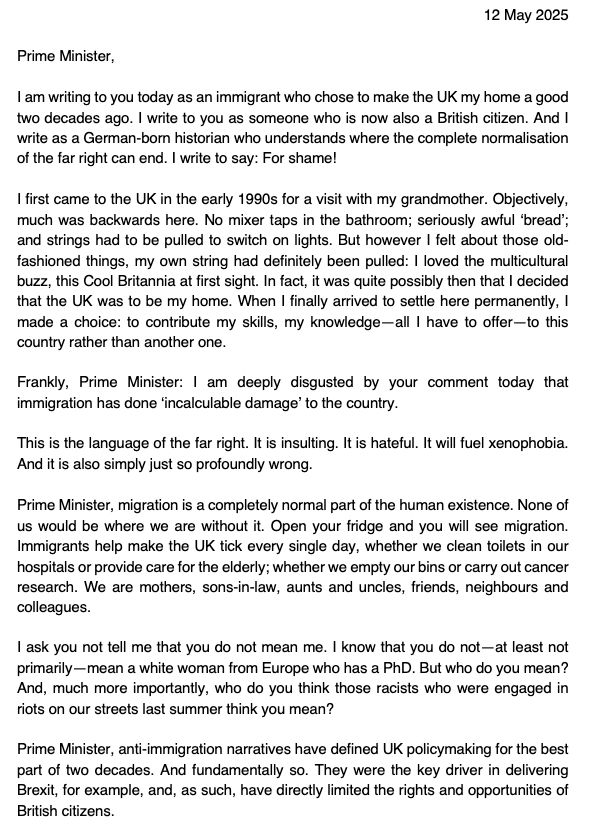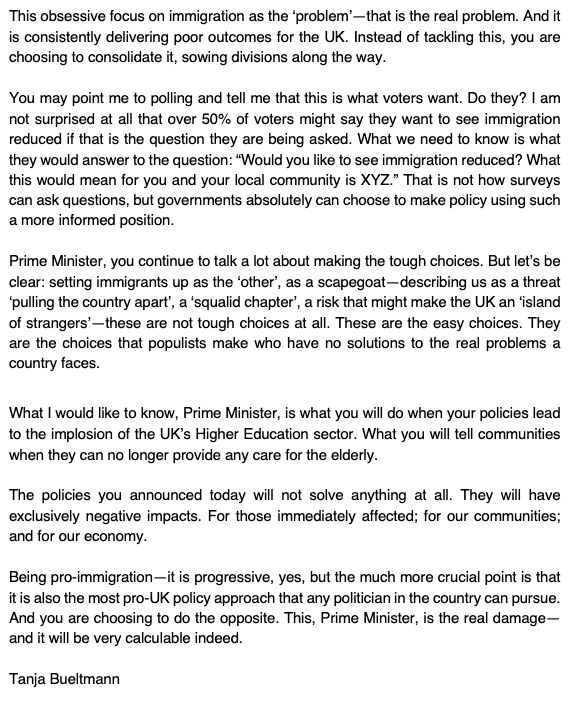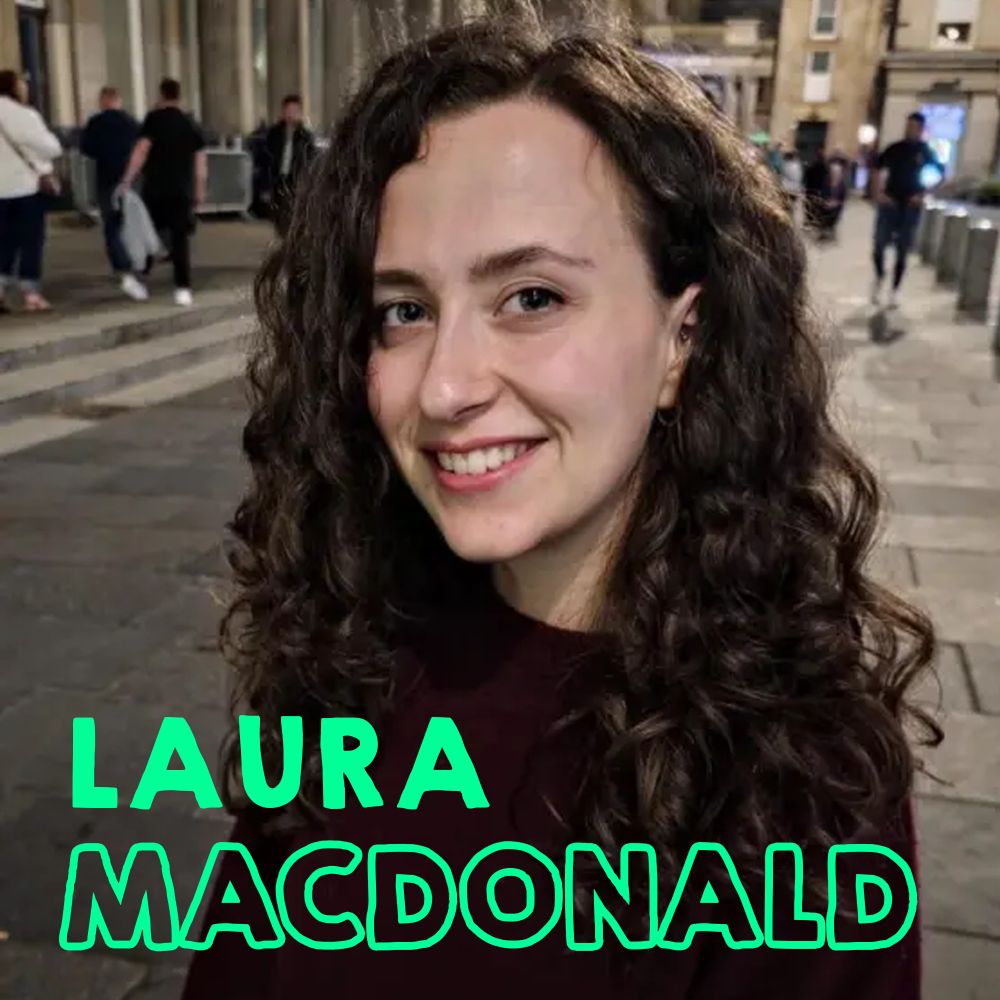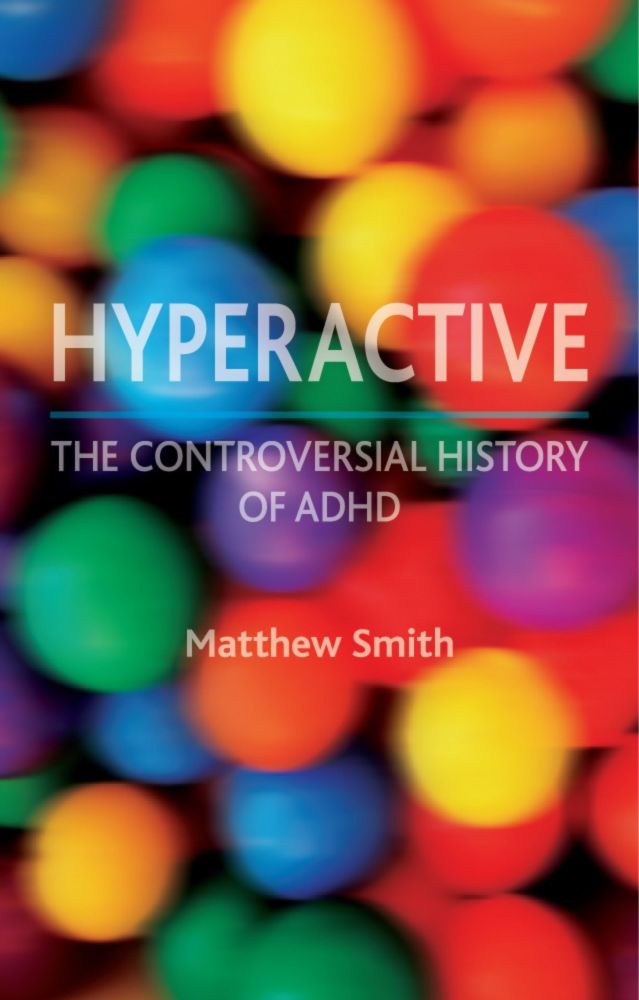A supportive, encouraging and inspirational team doing hugely important work. Grateful to have this wonderful institution on my doorstep to learn from! www.thenational.scot/news/2552704...
08.10.2025 14:11 — 👍 3 🔁 3 💬 0 📌 0

Slightly amended so I can fit this here:
I am writing to you as an immigrant who chose to make the UK my home. As someone who is now also a British citizen. And as a German-born historian who understands where the complete normalisation of the far right can end. I write to say: For shame!
I first came to the UK in the 1990s for a visit with my grandmother. Objectively, much was backwards here. No mixer taps in the bathroom; awful ‘bread’; and strings had to be pulled to switch on lights. But however I felt about this, my own string had been pulled: I loved this Cool Britannia. It was quite possibly then that I decided that the UK was to be my home. When I arrived to settle here permanently, I made a choice: to contribute my skills, my knowledge—all I have to offer—to this country rather than another one.
I am deeply disgusted by your comment today that immigration has done ‘incalculable damage’ to the country.
This is the language of the far right. It is insulting, hateful & will fuel xenophobia. And it is just wrong.
Migration is a normal part of the human existence. None of us would be where we are without it. Open your fridge and you will see migration. Immigrants help make the UK tick every single day, whether we clean toilets in our hospitals or provide care for the elderly; whether we empty our bins or carry out cancer research. We are mothers, sons-in-law, aunts and uncles, friends, neighbours and colleagues.
I ask you not tell me that you do not mean me. I know that you do not—at least not primarily—mean a white woman from Europe who has a PhD. But who do you mean? And, much more importantly, who do you think those racists who were engaged in riots on our streets last summer think you mean?
Anti-immigration narratives have defined UK policymaking for the best part of two decades. And fundamentally so. They were the key driver in delivering Brexit, for example, and, as such, have directly limited the rights and opportunities of British citizens.

This obsessive focus on immigration as the ‘problem’—that is the real problem. And it is consistently delivering poor outcomes for the UK. Instead of tackling this, you are choosing to consolidate it, sowing divisions along the way.
You may point me to polling and tell me that this is what voters want. Do they? I am not surprised at all that over 50% of voters might say they want to see immigration reduced if that is the question they are being asked. What we need to know is what they would answer to the question: “Would you like to see immigration reduced? What this would mean for you and your local community is XYZ.” That is not how surveys can ask questions, but governments absolutely can choose to make policy using such a more informed position.
Prime Minister, you continue to talk a lot about making the tough choices. But let’s be clear: setting immigrants up as the ‘other’, as a scapegoat—describing us as a threat ‘pulling the country apart’, a ‘squalid chapter’, a risk that might make the UK an ‘island of strangers’—these are not tough choices at all. These are the easy choices. They are the choices that populists make who have no solutions to the real problems a country faces.
What I would like to know, Prime Minister, is what you will do when your policies lead to the implosion of the UK’s Higher Education sector. What you will tell communities when they can no longer provide any care for the elderly.
The policies you announced today will not solve anything at all. They will have exclusively negative impacts. For those immediately affected; for our communities; and for our economy.
Being pro-immigration—it is progressive, yes, but the much more crucial point is that it is also the most pro-UK policy approach that any politician in the country can pursue. And you are choosing to do the opposite. This, Prime Minister, is the real damage—and it will be very calculable indeed.
Tanja Bueltmann
My letter to the Prime Minister. #immigration
12.05.2025 14:46 — 👍 1049 🔁 449 💬 80 📌 72

Is Rural Living Better for Mental Health?
Does being a rural mouse give you a better chance of having good mental health than being a city mouse?
One of the things I got up to on the @sshmedicine.bsky.social writing retreat at Ross Priory @unistrathclyde.bsky.social @strathhumanities.bsky.social
www.psychologytoday.com/gb/blog/a-sh...
10.04.2025 16:04 — 👍 6 🔁 3 💬 0 📌 0
Loved hearing about this project at the last OHA conference and hope to be near enough to Ipswich to visit this exhibit soon!
02.04.2025 21:22 — 👍 1 🔁 1 💬 0 📌 0
Project MUSE - The Women's Right to Choose Group and Abortion Rights Activism in Early 1980s Dublin
This website uses cookies to ensure you get the best experience on our website. Without cookies your experience may not be seamless.
New article by me on the Women's Right to Choose Group and abortion rights activism in 80s Dublin. I loved working on this. Thanks to my interviewees,reviewers & special issue editors Gayle Davis & Linda Bryder. Please DM if you'd like a copy. #histmed #reprorights muse.jhu.edu/pub/424/arti... [1/2]
17.03.2025 13:41 — 👍 58 🔁 27 💬 1 📌 0

Poster for Oral History project
Are you a South Asian medical practitioner in Scotland? Monique Lerpiniere is a PhD student at the University of Strathclyde, working with the Royal College of Physicians and Surgeons of Glasgow.
Please contact Monique on monique.lerpiniere.2022@uni.strath.ac.uk and please share 🙏 😊
05.03.2025 22:20 — 👍 8 🔁 4 💬 0 📌 0


For #InternationalWomensDay we celebrate Agnes Owens whose darkly comic stories of everyday working-class life brought a satirical edge to the wealth of post-industrial urban Scottish fiction produced at the end of the 20th cent, can’t wait to open @aowensarchive.bsky.social later this year!
08.03.2025 07:44 — 👍 11 🔁 6 💬 0 📌 0

A poster for the 2025 Strathclyde PGR Wellbeing Society Ball. Hosted at St Luke's in Glasgow on April 29th. Ticket includes a 3 course meal, table drinks and ceilidh dance.
Come join the fun! Tickets on sale now for the 2025 PGR Ball. See you there!! 💃🎊🕺
28.02.2025 12:29 — 👍 0 🔁 0 💬 0 📌 0
Just over a week left to get your abstracts in!
26.02.2025 14:52 — 👍 2 🔁 1 💬 0 📌 0

BBC Radio 4 - Archive on 4, 22/02/2025
Sally Marlow reveals the changing faces of ADHD and why it remains so contentious.
Looking forward to this BBC Archive on 4 broadcast on the history of ADHD, not least because I was interviewed for it. It comes out on the 22nd of February and the programme is called Trouble Staying Still.
www.bbc.co.uk/programmes/m...
13.02.2025 17:01 — 👍 10 🔁 3 💬 1 📌 0

A photo of Laura Macdonald smiling on a street. Her name is written in green text underneath
📢 New Featured Researcher for Feb '25
Laura MacDonald (@laurzzs.bsky.social) is a PhD Researcher at @strathhasspgrs.bsky.social studying the writings of Agnes Owens in collaboration with @agrayarchive.bsky.social & @aowensarchive.bsky.social
✍️
Read more 🔗 sgsahresearch.com/featured-res...
07.02.2025 13:13 — 👍 9 🔁 4 💬 1 📌 1
Job klaxons! We are recruiting three postdoc Fellows to work on the global histories of #HIV and #AIDS #activism in #India; #South #Africa; #Turkey and the Middle East. Thanks to generous funding from the UKRI. You may find the links in the comments below.
04.02.2025 10:03 — 👍 31 🔁 24 💬 4 📌 4


Super excited to be off on 'tour' next week for these two events organised by my lovely colleagues @ymcfadden.bsky.social, @phatcontroller.bsky.social & @silviahedley.bsky.social If you find yourself in Glasgow or Brighton, do come along! @ihr.bsky.social @ids.ac.uk @uolondon.bsky.social
31.01.2025 17:33 — 👍 5 🔁 3 💬 0 📌 0

PLEASE SHARE👉🏽We are delighted to partner with Kelvingrove Art Gallery & Museum for GRAY DAY 2025 on 2 x FREE TALKS
- 25.02.25, 1-2pm Talk with our @sgsah.bsky.social CDA student Lauren Forde
- 28.02.25 12pm Join Glasgow Life Museums’ Conservator Hazel Neil and Producer|Curator Katie Bruce
31.01.2025 07:32 — 👍 19 🔁 13 💬 0 📌 0
First post on bsky and first @cshhh.bsky.social seminar @unistrathclyde.bsky.social. Next Tuesday we will be joined by Nikolaos Papadogiannis who will present on 'Translating interviews with Greek transgender HIV/AIDS activists', 4-5.30pm in the Teaching and Learning Building 565. All welcome!
30.01.2025 10:02 — 👍 4 🔁 2 💬 1 📌 1
History in Action: the podcast for historians making a difference. Have a listen and let me know who I should interview next!
soundcloud.com/historyinact...
16.01.2025 09:22 — 👍 1 🔁 1 💬 0 📌 0

School Meals Stories
Whether loved or loathed, school meals have been a fixture of British childhood for generations. Heather Ellis and Isabelle Carter discuss what the history of school meals can tell us about broader social and cultural change.
How do individual narratives of school meals reflect broader societal change?
@heatherlwellis.bsky.social and Isabelle Carter collect interegenerational oral histories of school dinners @esrcschoolmeals.bsky.social, from Glasgow's play pieces to mum's fish paste sandwiches.
www.historyworkshop....
09.01.2025 16:23 — 👍 10 🔁 6 💬 3 📌 4
Really enjoyed hearing about this project at the OHA conference (and attempting my own awful drawing of a sponge pudding and custard!). A great article to follow up with too. Such an interesting project.
13.01.2025 15:36 — 👍 1 🔁 0 💬 0 📌 0

Radical Glasgow Tours voucher
This voucher entitles the bearer to come on one radical history tour in 2025 - choose from the following dates, times and tours: Saturday Feb 8th...
New Radical Glasgow Tours festive fundraiser - grab a voucher for a tour in Feb, all ££ split between the vital work of Addameer supporting Palestinian political prisoners & Glasgow City Mission which helps people affected by homelessness and poverty radicalglasgowtours.bigcartel.com/product/radi...
04.12.2024 13:47 — 👍 8 🔁 6 💬 0 📌 2
Not a problem Laura. People were kind enough to say it did so I'll take that ! :) Was a great chance to talk over the project in more detail so very grateful for the chance to get some thoughts out into the real world.
03.12.2024 19:04 — 👍 2 🔁 0 💬 1 📌 0

Colourful screenshot of an instagram grid with pictures including Nye Bevan on stage at Queens Park bandstand, the STUC Black Workers committee banner and a clipping of a newspaper report on a man charged with breach of the peace for kissing his male partner in George Square in 1985

Colourful screenshot of an instagram grid with pictures including a cardboard sign saying "history is ours and is made by the people", Lucy Parsons, CLR James and a stained glass window of John Maclean

Colourful screenshot of an instagram grid with pictures including the cover of Archie Hind's novel The Dear Green Place, Eurydice Glasgow women's socialist choir, boxer Len Johnson and La Pasionaria
Sorry to be doing "do you like radical history?" type posts, but I assume you do like radical history if you're following me here. If so you might also want to keep up with Radical Glasgow Tours on insta where I share tons of archive material, links and resources on histories from Glasgow & beyond
03.12.2024 15:40 — 👍 4 🔁 1 💬 0 📌 0

Such a great project. @strathhasspgrs.bsky.social @unistrathclyde.bsky.social
02.12.2024 17:46 — 👍 12 🔁 2 💬 0 📌 0
Playwright etc. For permissions etc, Brennan Artists. https://www.brennanartists.com/
Academy of Finland postdoc & Aaltonen Foundation PI at University of Jyväskylä | PhD from University of Glasgow | Chair of Finnish Oral History Network | Young Academy Finland member | Trade union activist | Historian of gender, media, emotions & protest
Social Historian | Glasgow, Irish Adjacent | Humanist | Writes about sex, religion, queer lives, moral panics. And for a newspaper.
Documentary director & scone afficianado
Director of Teaching and Learning with the Core Collaborative
Unlock the curiosity, creativity and potential in absolutely every learner; we are a PLN dedicated to advancing learner agency worldwide. http://bit.ly/moreTCC
Mimi & Todd Press publishes and markets authors who are making a difference, have a story to tell and are making an IMPACT.
News, events and stories from the library, archive and museum at the Royal College of Physicians and Surgeons of Glasgow
https://heritage.rcpsg.ac.uk/ #histmed #libraries #archives #museums
Life is the green leaf.
We're an independent design studio inspired by Charles Rennie Mackintosh.
Tel: +44 (0)1604 312960
Shop here: duille.com
History of disability, work, war and parasport
Lecturer at the University of Glasgow
Rivers; Travel and Migrations; Comparative Lit; Balkans&Central Europe
🪬🧿 Explorer and storyteller. Freemason Discovering Scotland’s hidden history, 🌍
My novel: www.epochofaodhan.com
my yt: www.youtube.com/c/journeydude
Pens: www.luxurywoodenpens.com
Prints: www.scottishwallart.com
🕊️ Peace to all, No AI pls
Dad; Senior Lecturer in European History, University of Stirling; UKRI Future Leaders Fellow studying the history of global HIV activism; writes in personal capacity
Lecturer | Humanities Training | @ihr.bsky.social @ials.bsky.social & School of Advanced Study | Caribbean Seminars @ilcs.bsky.social | Book: 'Legal Identity, Race & Belonging' https://shorturl.at/JPH0j Profile: https://shorturl.at/sKiXa #digitalidentity
Scotland’s living memory. If you can think of it, we probably have it.
Centre for the Social History of Health and Healthcare,
@UniStrathclyde
& @CaledonianNews
Scotland's leading centre for the history of health and medicine 📚💊
https://tinyurl.com/3y2u52bw
art & architectural historian / visual, material & religious culture
Researcher careers and development devotee. Helping PhD and postdoc researchers make career transitions, especially beyond academia. Trainer and PhD careers blogger at: https://phd-careers.co.uk Living with #AZOOR 👁























